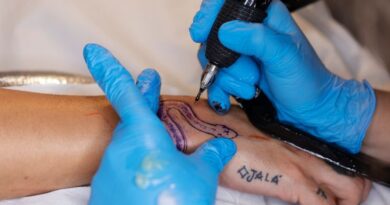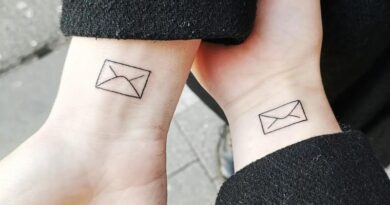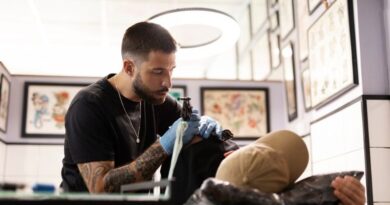Tattoos are like colorful stories written on our skin. They can be beautiful, meaningful, and a little mysterious. You may already have a tattoo, or you’re thinking about getting one. Either way, you’re in the right place!
In this blog, we’re going to explore tattoos in a simple and fun way. No fancy words or confusing stuff—just Nine important things you should know about tattoos. We’ll talk about what they are, How to take care of them, how to take care of tattoo scabs, and much more.
So, let’s dive into the world of tattoos and discover the secrets behind these awesome pieces of art that people wear on their bodies.
9 Things You Should Know About Tattoo
What Age Do You Need To Get A Tattoo?
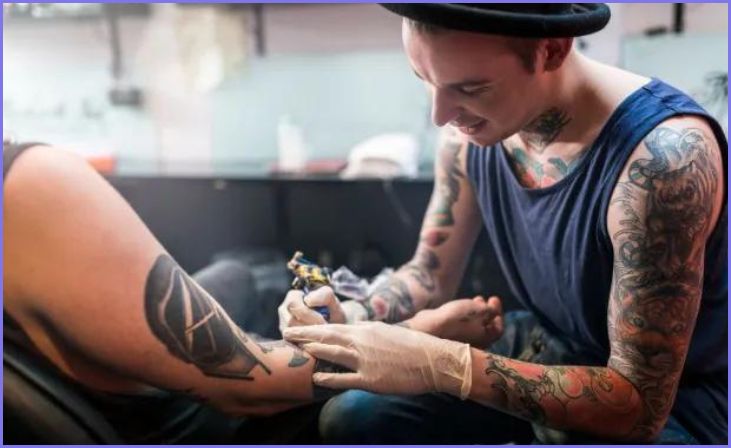
The minimum age to get a tattoo varies by country and state, as it’s regulated by local laws. However, there are some general guidelines:
- 18 and Older: In many places around the world, including most states in the United States and many European countries, the legal age to get a tattoo without parental consent is 18 years old. This means you can walk into a tattoo studio and get inked if you’re 18 or older.
- 16 to 18 with Parental Consent: In some areas, if you’re under 18 but at least 16, you may be allowed to get a tattoo with the written consent of a parent or legal guardian. The rules and requirements for consent can vary, so it’s essential to check your local regulations.
- Under 16: It’s generally not legal for individuals under 16 to get tattoos, even with parental consent, in many places. Tattoo studios prioritize safety and may have age restrictions to avoid potential health risks or regrets later in life.
Keep in mind that even if you meet the minimum age requirement, a reputable tattoo studio may have additional policies, such as refusing to tattoo anyone who appears intoxicated or making sure clients are making informed decisions about their tattoo choices.
Also Read- What Does the Teardrop Tattoo Mean
How to Take Care of a Tattoo?
Tattoo Aftercare Balm 2.65oz Healing Fresh Tattoo Balm
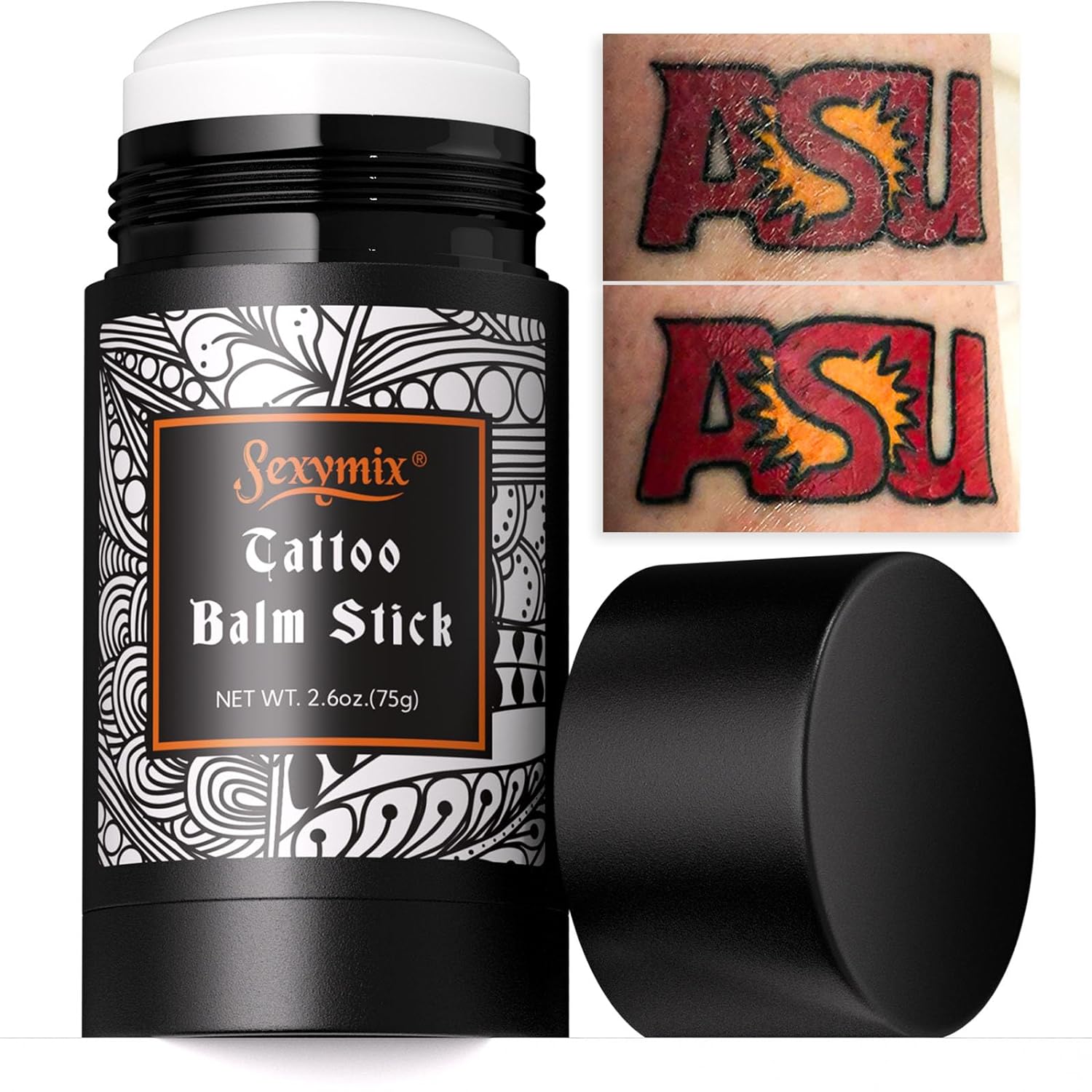
Tattoo Aftercare Balm
- Brand SEXY MIX
- Size 2.65 Ounce
- Water Resistance Level Water Resistant
- Number of Pieces 1
- Age Range (Description) Adult
Taking proper care of a new tattoo is crucial to ensure it heals well and maintains its vibrancy for years to come. Here’s a step-by-step guide on how to take care of a tattoo:
Listen to Your Tattoo Artist
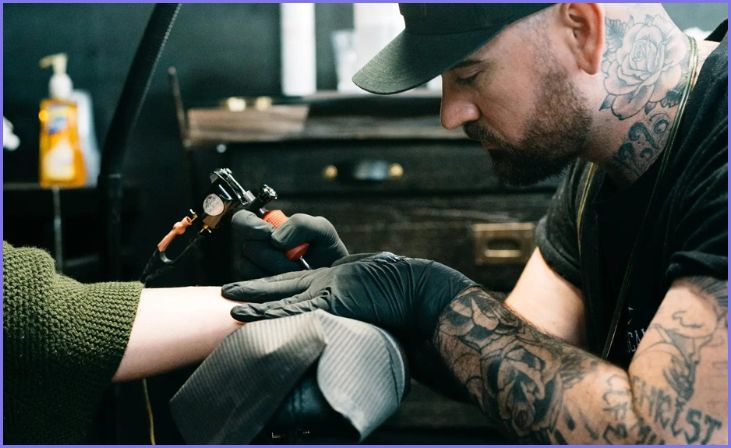
Listening to your tattoo artist means paying close attention to the guidance and instructions provided by the professional who inked your tattoo. Tattoo artists are experienced in the art and its aftercare, so their advice is invaluable. They will typically offer specific instructions on cleaning, moisturizing, and protecting your new tattoo to ensure it heals properly and retains its vibrancy. Following their recommendations helps prevent infections, scarring, and other complications, ultimately leading to a successful and beautiful tattoo that you’ll enjoy for years to come.
Leave the Bandage On
Leaving the bandage on is a crucial step in tattoo aftercare. After getting a new tattoo, your artist will cover it with a bandage or plastic wrap to protect it from external contaminants and promote the initial healing process. It serves as a barrier against dirt, bacteria, and friction. This protective covering should be left on for a specified time, usually a few hours, or as advised by your tattoo artist. Removing it too early can expose your fresh tattoo to potential infections and disrupt the early stages of healing.
Clean Your Tattoo Gently
Clean your tattoo gently means washing your new tattoo with care and delicacy. After removing the initial bandage, you should use lukewarm water and mild, fragrance-free soap to clean your tattoo. It’s important to be gentle during this process, using only your clean hands to remove any ointment, dried blood, or lymph fluid without scrubbing or rubbing. Being gentle helps prevent any damage to the delicate, healing skin and the tattoo itself.
Pat Dry
Gently dry your fresh tattoo after cleaning it. Instead of vigorously rubbing or using a regular towel, which can be abrasive and potentially harm your tattoo, you should lightly pat the tattooed area with a clean, soft paper towel or allow it to air dry naturally. This approach prevents any unnecessary friction or irritation, which is especially important during the initial healing stages when the skin is sensitive. By patting the area dry, you promote a safer and more comfortable healing process for your new tattoo.
Apply an Antibacterial Ointment
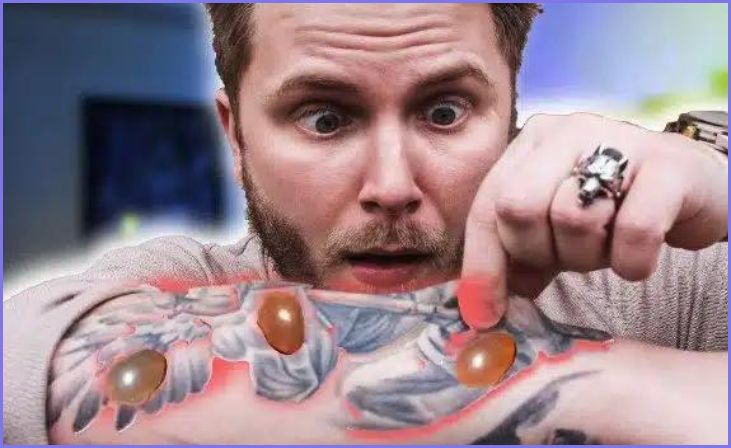
Apply an antibacterial ointment involves putting a thin layer of a specialized ointment or cream on your fresh tattoo after cleaning it. This ointment serves several important purposes: it helps prevent infection by acting as a barrier against bacteria, keeps the tattoo moisturized to aid in healing, and can soothe any discomfort or itching. Using an ointment recommended by your tattoo artist or a trusted brand is essential, as they are designed for tattoo aftercare.
Avoid Excessive Moisturizing
Avoid excessive moisturizing means that while it’s essential to keep your fresh tattoo adequately moisturized to aid in the healing process, you should refrain from overdoing it. Applying too much ointment or lotion can have adverse effects, including clogging pores and slowing down the healing process. Excessive moisturizing can also lead to the formation of scabs, which can affect the final appearance of your tattoo.
Keep it Clean and Moisturized
Keeping it clean and moisturized is a fundamental principle in tattoo aftercare. It means maintaining a balance between ensuring your tattooed area is clean and preventing it from drying out. Cleaning the tattoo gently with mild soap and water removes impurities and helps prevent infection. Simultaneously, applying a suitable moisturizer or ointment keeps the skin hydrated, aiding in the healing process and preventing excessive scabbing. This combination of cleanliness and hydration is essential for a successful and vibrant tattoo outcome, as it supports the skin’s natural healing while minimizing potential complications.
Avoid Soaking
Avoid soaking means refraining from submerging your fresh tattoo in water for an extended period. Whether it’s in a bathtub, swimming pool, or hot tub, soaking can have adverse effects on a healing tattoo. Prolonged exposure to water can soften the tattoo scabs prematurely, potentially leading to color loss or infection. While quick showers are generally fine, it’s essential to shield your tattoo from direct, high-pressure water.
No Scratching or Picking
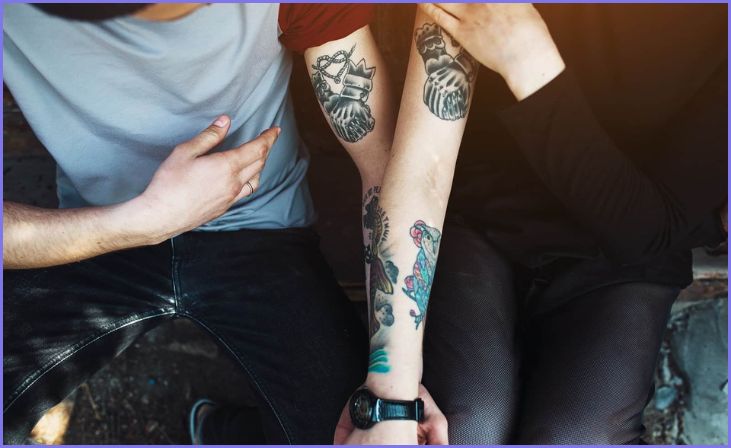
No scratching or picking is a crucial rule during tattoo aftercare. It means resisting the urge to scratch or pick at the scabs or any dry skin that forms on your fresh tattoo. While itching is a common part of the healing process, scratching or picking can damage the tattooed area, disrupt the healing, and potentially lead to infections or scarring. Instead, gently tap or pat the itchy area if you must alleviate discomfort.
Protect from Sunlight
Protecting from sunlight is an important aspect of tattoo aftercare. It means shielding your healing or newly-inked tattoo from direct sunlight during the initial weeks of healing. Sun exposure can fade and damage the tattoo, causing it to lose its vibrancy and sharpness. To safeguard your tattoo, wear protective clothing or use sunscreen with a high SPF when it’s exposed to the sun. This precaution helps preserve the quality and longevity of your tattoo, ensuring it remains a vibrant and beautiful piece of art on your skin.
Do’s and Don’ts to Keep in Mind
Certainly! Here are some important “Do’s and Don’ts” to keep in mind for proper tattoo aftercare, presented in a table format:
| Do’s | Don’ts |
| 1. Do follow your tattoo artist’s aftercare instructions precisely. | 1. Don’t pick or scratch your tattoo, even if it itches. |
| 2. Do keep your tattoo clean with mild soap and water. | 2. Don’t soak your tattoo in pools, hot tubs, or baths during the initial healing period. |
| 3. Do apply a thin layer of recommended tattoo-specific ointment or moisturizer. | 3. Don’t over-moisturize your tattoo; use only when it feels dry. |
| 4. Do protect your tattoo from direct sunlight with clothing or sunscreen. | 4. Don’t wear tight or abrasive clothing that can rub against your tattoo. |
| 5. Do stay hydrated and maintain overall skin health. | 5. Don’t rush the healing process; be patient and follow the timeline. |
How to Take Care of Tattoo Scabs
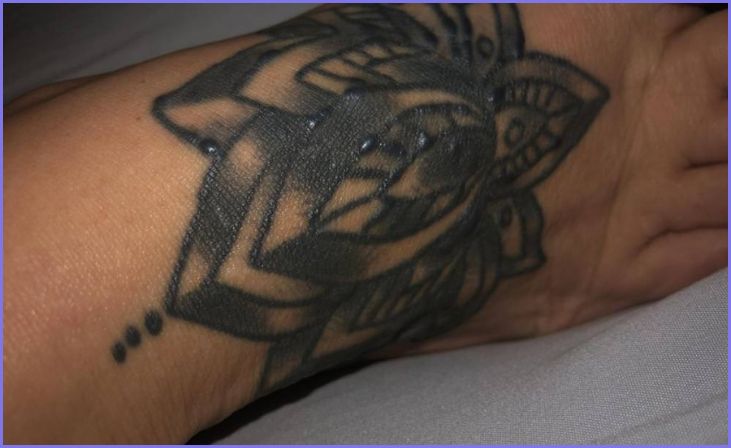
Taking care of tattoo scabs is an essential part of the overall tattoo healing process. Here’s a guide on how to properly care for tattoo scabs:
Do Not Pick or Scratch
It is a critical piece of advice during tattoo aftercare. It means refraining from touching or attempting to remove any scabs or dry skin that forms over your fresh tattoo. Picking or scratching can damage the delicate healing skin and the tattoo itself, potentially leading to scarring, color loss, or infection. Instead, trust the natural healing process; scabs will fall off when the underlying skin is ready.
Keep the Scabs Dry
Avoid excessive moisture on the scabs. Keeping the scabs dry advises against exposing your tattoo scabs to excessive moisture. While it’s essential to clean your tattoo gently with mild soap and water, it’s equally important not to soak the scabs. Prolonged exposure to water, like extended baths or swimming, can soften the scabs prematurely, potentially leading to complications such as color loss or delayed healing.
Gently Clean the Tattoo
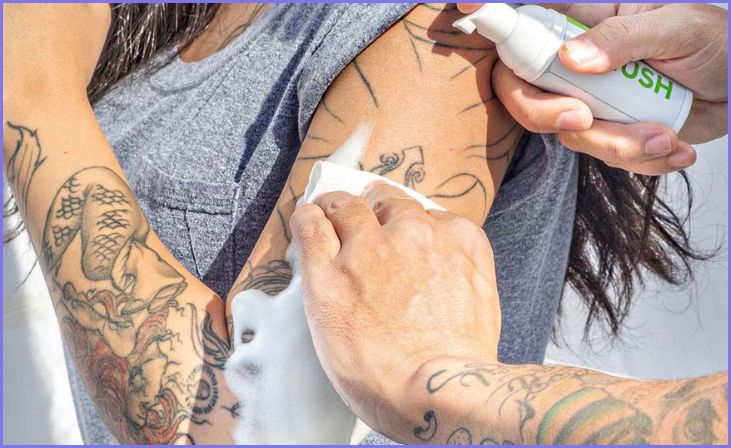
Use care and mildness when washing your fresh tattoo. To clean it, use lukewarm water and a gentle, fragrance-free soap. It’s crucial to avoid any aggressive scrubbing or using rough materials like washcloths, as these can irritate the healing skin and potentially damage the tattoo. Instead, use your clean hands to delicately remove any ointment, dried blood, or lymph fluid. By being gentle during the cleaning process, you promote proper healing and minimize the risk of complications, ensuring your tattoo looks its best in the end.
Apply a Thin Layer of Moisturizer
After cleaning your tattoo, using a specialized tattoo-specific moisturizer or ointment, apply a very thin layer to the tattooed area. This thin coating helps keep the skin hydrated, preventing excessive dryness, cracking, or scabbing. It’s essential not to over-moisturize; applying too much can suffocate the tattoo and hinder the healing process. By following this instruction, you strike the right balance, promoting proper healing and preserving the vibrancy of your tattoo.
Stay Hydrated
Maintaining sufficient water intake for overall skin health during your tattoo’s healing process. Proper hydration helps your body heal more effectively, indirectly benefiting your tattoo. When you’re well-hydrated, your skin remains in better condition, which promotes the healing of your tattoo and may reduce itching or discomfort. While staying hydrated is essential, it’s just one aspect of proper aftercare, so remember to follow all your tattoo artist’s instructions to ensure your tattoo heals beautifully.
Tattoo Aftercare Bandage Roll 6″x 2 Yard
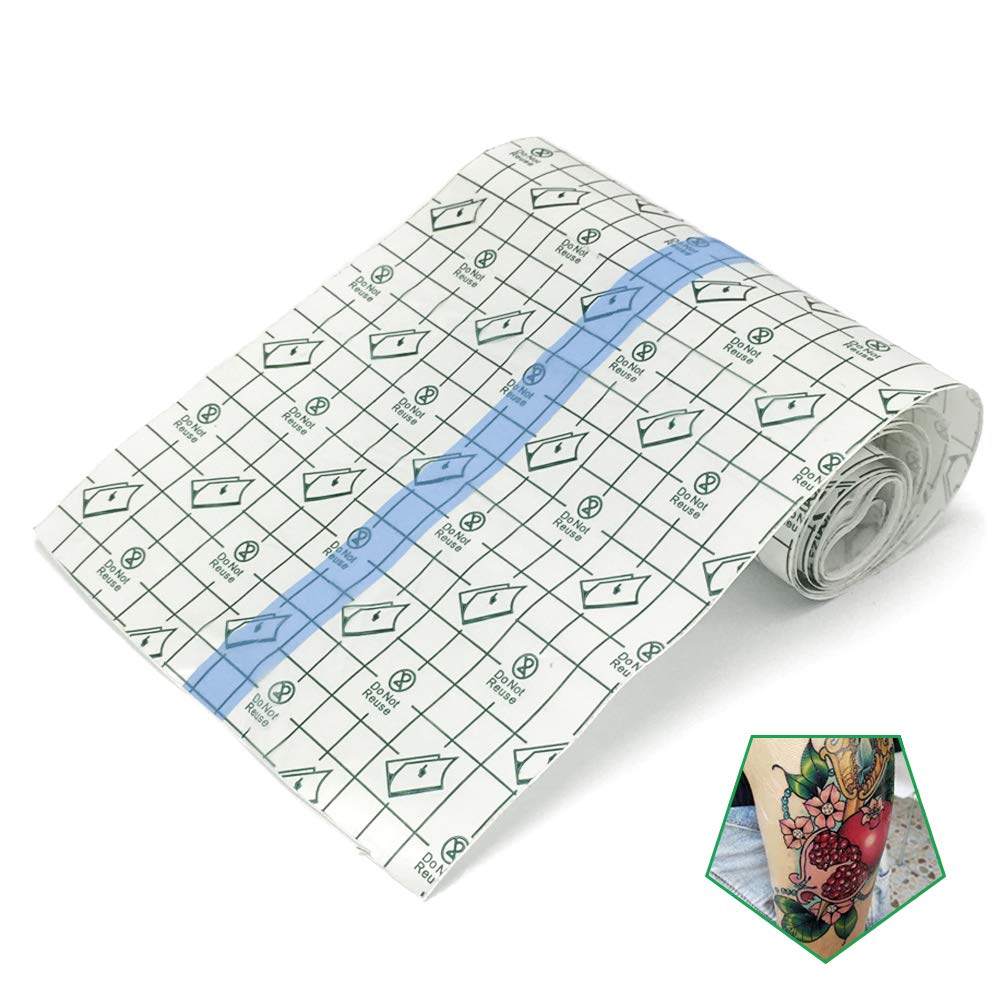
Tattoo Aftercare Bandage
- More Safe And Healthy
- Easy To Use
- Waterproof And Moisture Protection
- Thin And Transparent
- Various Purpose
For More- Most Painful Places to Get a Tattoo
Why has my tattoo scab peeled away with no ink underneath?
If your tattoo scab came off, and there’s no ink underneath, it can be concerning, but it’s not necessarily a cause for alarm. Here are a few reasons why this might happen:
Natural Healing Process: Tattoo scabs are a protective layer that forms as your tattoo heals. It’s normal for scabs to eventually fall off on their own as your skin regenerates. In some cases, the ink may have already settled into the skin during the tattooing process, and the absence of ink under the scab could be because it was securely embedded in the lower layers of your skin.
Proper Aftercare: If you followed proper tattoo aftercare instructions, such as avoiding picking or scratching the scabs, the chances of preserving the ink underneath are higher. However, even with the best aftercare, it’s possible for tiny bits of ink to come off with the scab.
Tattoo Depth: The depth at which the tattoo artist places the ink can influence how it appears during the healing process. If the ink was placed too shallow, it might not be visible after the scabs fall off. Conversely, if it was placed deeper, the ink may remain intact.
Ink Quality and Technique: The quality of the ink and the tattoo artist’s technique can also impact how well the ink stays on the skin. High-quality ink and skilled application are more likely to result in ink retention.
Skin Type: Individual factors like skin type and skin health can influence how a tattoo heals. Some people may naturally have skin that retains ink better than others.
Can You Take A Bath After Getting A Tattoo?

After getting a tattoo, it’s generally advisable to avoid taking baths, especially for the first few weeks of the healing process. Here’s why:
Soaking Risk: Bathing, particularly in a bathtub, exposes your fresh tattoo to prolonged moisture. Excessive soaking can soften the scabs that form part of the healing process, potentially causing them to come off prematurely. This can result in loss of ink and affect the final appearance of your tattoo.
Water Quality: The quality of the water in your bath is also important. Tap water may contain bacteria or impurities that can increase the risk of infection when they come into contact with your healing tattoo.
Chemicals in Bath Products: Many bath products, such as bath salts, bubble bath solutions, or bath bombs, contain chemicals and fragrances that can irritate or damage the healing skin. It’s best to avoid using such products on or near your fresh tattoo.
Instead of baths, opt for quick showers during the initial healing period. Showers allow you to clean your tattoo without prolonged exposure to water. Make sure the water pressure is gentle, and avoid directing it directly onto your tattoo. Be gentle when washing the tattooed area and use mild, fragrance-free soap.
Can you put sunscreen on a new tattoo?
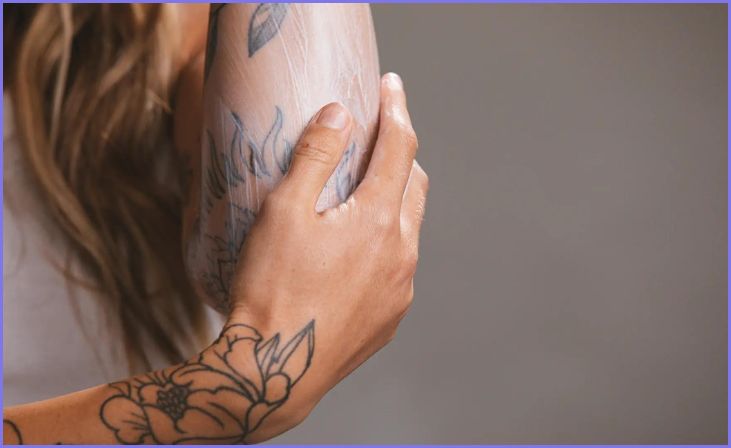
Applying sunscreen on newly-inked tattoos is dangerous because the skin is like an open wound with many needles stabbed through it. Infection, discomfort, and incomplete healing are all risks associated with applying sunscreen to freshly inked skin.
Applying sunscreen to a fresh tattoo is akin to applying it to an open wound; consequently, avoid doing so. Your ink’s appearance can be permanently altered or ruined by long-term damage, which is a huge disappointment after you’ve made the investment.
In order to ensure that the healing process continues indefinitely, it is critical that the healing process be completed. You can use the Makra Tattoo Care Sunscreen for a new tattoo.
Makra Tattoo Care Sunscreen
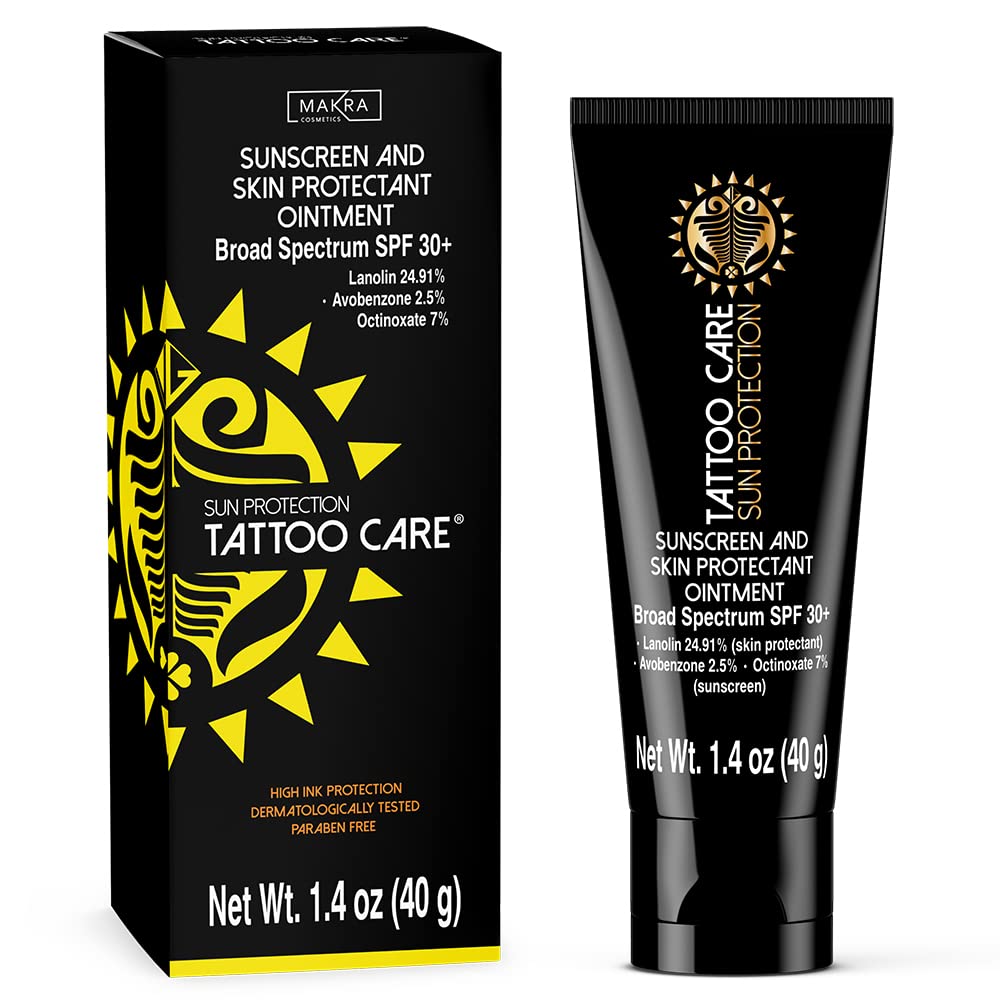
Sunscreen
- Scent Vanilla-Coconut
- Item Weight 0.08 Pounds
- Number of Items 1
- Unit Count 1.35 Fl Oz
- Skin Type All, Oily, Sensitive, Dry, Normal
Can you donate blood if you have a tattoo?
Yes, you can typically donate blood if you have a tattoo, but there are some guidelines and considerations to keep in mind:
Wait Period: In many countries, there is a waiting period after getting a tattoo before you can donate blood. The waiting period can vary, but it’s often around 3 to 12 months. This waiting period is in place to reduce the risk of potential infections associated with getting a tattoo.
Tattoo Studio Safety: “Tattoo studio safety” refers to the measures and practices that professional tattoo studios put in place to ensure a clean and safe environment for clients. This includes maintaining strict hygiene standards, using sterilized equipment, and following proper infection control procedures. Reputable tattoo studios prioritize the health and well-being of their clients by using disposable needles and ink caps, autoclaving reusable equipment, and providing thorough aftercare instructions. Tattoo artists at safe studios also wear gloves and take precautions to minimize the risk of cross-contamination.
Health Assessment: Health Assessment refers to the process of evaluating an individual’s physical, mental, and sometimes emotional well-being. It involves gathering information about a person’s medical history, current health status, lifestyle, and any potential risk factors. Health assessments are conducted by healthcare professionals to understand a patient’s overall health, identify potential health issues or concerns, and develop appropriate care plans or recommendations.
Local Regulations: Local regulations refer to the specific rules and guidelines that are enforced by local authorities or governing bodies in a particular area or jurisdiction. These regulations can cover a wide range of issues, including zoning, business licenses, health and safety standards, and more. In the context of tattooing, local regulations may dictate aspects such as where tattoo studios can operate, what safety and hygiene standards they must adhere to, and any licensing requirements for tattoo artists and studios.
Health and Well-Being: Before donating blood, ensure you are in good health and feeling well. Donating blood can temporarily affect your body, so it’s essential to be stable. If you have any concerns about how your tattoo might impact your ability to donate, consult with your healthcare provider.
Ink Type and Location: Some blood donation centers may inquire about the type of ink used in your tattoo and its location on your body. While this is less common, it’s possible that certain types of ink or tattoo placements could raise additional questions during the donation process. Again, honesty and transparency are crucial when discussing your tattoo with the donation center staff.
Can We Go To Heaven With Tattoos

The concept of whether individuals with tattoos can go to heaven is a matter of personal belief and faith, and it varies among different religious and cultural traditions. In many religious beliefs, having tattoos is not a direct factor that determines one’s eligibility for heaven or the afterlife. Salvation, righteousness, and moral behavior are often considered more important criteria.
In some religious traditions, tattoos may be viewed negatively or positively depending on their symbolism and purpose. For instance, tattoos with religious or spiritual significance may be perceived as a form of devotion, while tattoos with harmful or offensive imagery might be discouraged.
Ultimately, the question of whether individuals with tattoos can go to heaven is deeply subjective and dependent on individual religious beliefs and interpretations. It is advisable to consult with religious leaders or scholars within a specific faith tradition for guidance on how tattoos are viewed within that particular religious context.
The Bottom Line
In conclusion, tattoos are much more than just ink on the skin; they’re a canvas for self-expression and artistry that spans cultures and centuries. From design choices to aftercare, from the pain factor to cultural significance, this guide has covered the essential aspects of tattoos. As you venture into the world of tattoos, remember to prioritize safety, consult experienced artists, and embrace the meaningful stories and memories that these intricate designs can encapsulate. Tattoos have the power to reflect your individuality, connect you with rich traditions, and stand as timeless testaments to your unique journey through life.
FAQs
It’s essential to consult with a healthcare professional before getting a tattoo if you have underlying medical conditions. Some conditions may increase the risks associated with tattooing.
Pain tolerance varies from person to person, and tattoo pain can depend on factors like placement and individual sensitivity. While some discomfort is common, many people find the experience manageable.
It’s generally recommended to avoid getting a tattoo during pregnancy and breastfeeding due to potential risks and concerns about ink entering the bloodstream. For tailored advice, speak with a healthcare practitioner.
Research and choose a reputable and experienced tattoo artist who aligns with your style and vision. Look at their portfolio, read reviews, and visit their studio to ensure they maintain proper hygiene and safety practices.
Tattoo regret is common. You have options, including tattoo removal techniques like laser removal or tattoo cover-ups by skilled artists. Keep in mind that both options may require time and investment.


